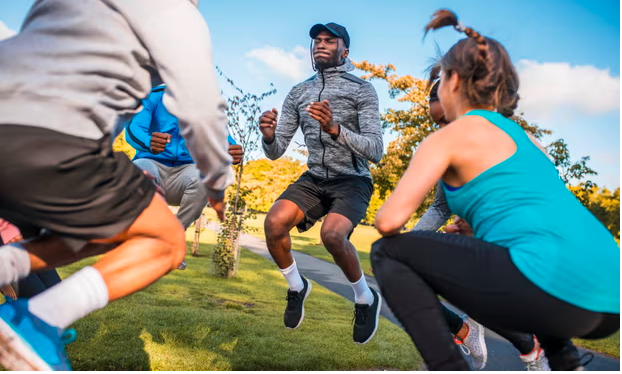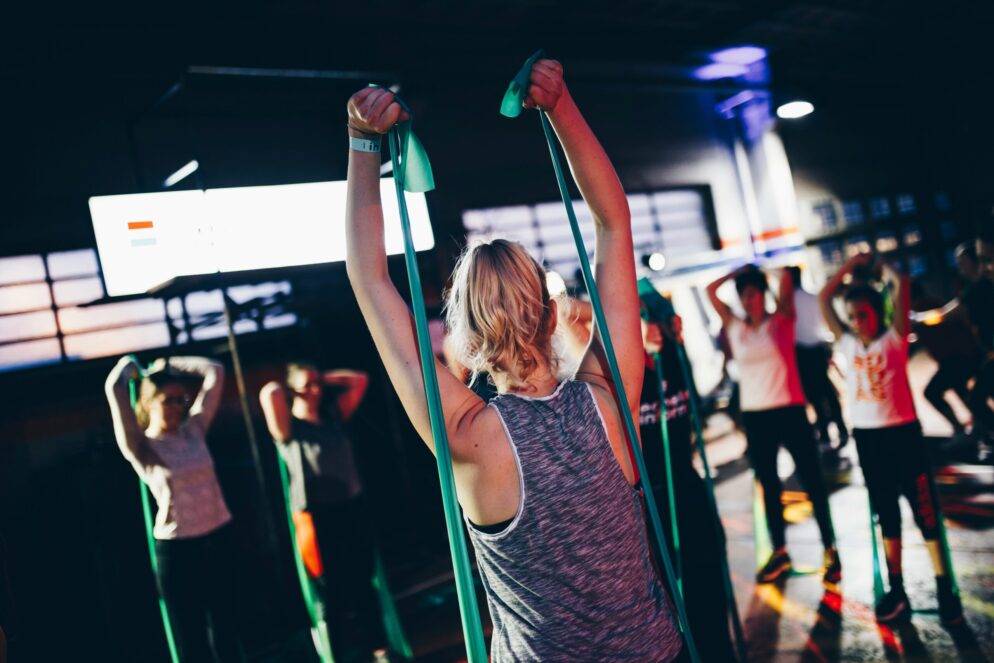Health and Fitness
The Importance of Nutrition for Fitness Enthusiasts

The Importance of Nutrition for Fitness Enthusiasts
When it comes to fitness, exercise is often the first thing that comes to mind. However, nutrition plays a crucial role in achieving fitness goals and maintaining overall health. For fitness enthusiasts, fueling the body with the right nutrients is essential for optimal performance, muscle growth, and recovery.
The Role of Macronutrients
Macronutrients, including carbohydrates, proteins, and fats, are the building blocks of a healthy diet. Each macronutrient serves a specific purpose in the body and is vital for fitness enthusiasts.
Carbohydrates
Carbohydrates are the primary source of energy for the body. They provide fuel for workouts and help replenish glycogen stores in the muscles. Fitness enthusiasts should focus on consuming complex carbohydrates such as whole grains, fruits, and vegetables, which provide sustained energy and essential nutrients.
Proteins
Proteins are essential for muscle repair and growth. They provide the necessary amino acids to rebuild muscle fibers after intense workouts. Fitness enthusiasts should aim to consume lean sources of protein such as chicken, fish, tofu, and legumes to support muscle recovery and development.
Fats
Contrary to popular belief, fats are an important part of a healthy diet. They provide energy, support hormone production, and aid in the absorption of fat-soluble vitamins. Fitness enthusiasts should opt for healthy fats found in avocados, nuts, seeds, and olive oil, while limiting saturated and trans fats.
The Power of Micronutrients
In addition to macronutrients, micronutrients are equally important for overall health and well-being. These include vitamins and minerals that support various bodily functions and help optimize performance.
Vitamins
Vitamins are essential for numerous processes in the body, including energy production, immune function, and tissue repair. Fitness enthusiasts should focus on consuming a variety of fruits and vegetables to ensure an adequate intake of vitamins such as vitamin C, vitamin E, and the B vitamins.
Minerals
Minerals play a crucial role in maintaining proper hydration, muscle contractions, and bone health. Fitness enthusiasts should pay attention to minerals like calcium, magnesium, and potassium, which are essential for optimal performance and recovery. These can be found in foods such as dairy products, leafy greens, and bananas.
The Timing of Nutrition
While the quality of nutrients is important, the timing of nutrition also plays a significant role for fitness enthusiasts. Pre- and post-workout nutrition can enhance performance, aid in recovery, and promote muscle growth.
Pre-Workout Nutrition
Consuming a balanced meal or snack before a workout provides the necessary energy to perform at your best. This meal should consist of carbohydrates for fuel and a moderate amount of protein to support muscle maintenance. Examples include a banana with peanut butter or a Greek yogurt with berries.
Post-Workout Nutrition
After a workout, the body is primed for nutrient absorption. Consuming a combination of carbohydrates and proteins within the first hour post-exercise helps replenish glycogen stores and kickstarts the muscle recovery process. Options include a protein shake with a banana or a chicken breast with sweet potatoes.
Common Nutrition Mistakes to Avoid
While understanding the importance of nutrition is essential, it’s also crucial to avoid common mistakes that can hinder progress and overall health.
Skipping Meals
Skipping meals, especially breakfast, can lead to low energy levels, poor concentration, and overeating later in the day. It’s important to fuel the body with regular, balanced meals to support overall health and fitness goals.
Overemphasizing Supplements
While supplements can complement a healthy diet, they should not replace whole foods. It’s best to focus on consuming a variety of nutrient-dense foods before considering supplements.
Ignoring Hydration
Proper hydration is often overlooked but is crucial for overall health and performance. Fitness enthusiasts should aim to drink an adequate amount of water throughout the day and increase intake during workouts.
Frequently Asked Questions
1. Can I achieve my fitness goals without focusing on nutrition?
Nutrition plays a vital role in achieving fitness goals. While exercise is important, fueling the body with the right nutrients optimizes performance, supports muscle growth, and aids in recovery.
2. How can I ensure I’m getting enough protein as a fitness enthusiast?
As a fitness enthusiast, it’s important to include lean sources of protein in your diet such as chicken, fish, tofu, and legumes. These provide the necessary amino acids for muscle repair and growth.
3. Should I avoid carbohydrates to lose weight?
Carbohydrates are essential for energy, especially for fitness enthusiasts. Instead of avoiding carbohydrates, focus on consuming complex carbs from whole grains, fruits, and vegetables for sustained energy and essential nutrients.
4. Are fats bad for my fitness goals?
Fats are an important part of a healthy diet and should not be avoided. Opt for healthy fats found in avocados, nuts, seeds, and olive oil, while limiting saturated and trans fats.
5. Can I rely on supplements for all my nutritional needs?
Supplements should not replace whole foods. While they can complement a healthy diet, it’s best to focus on consuming a variety of nutrient-dense foods to meet your nutritional needs.
6. How important is hydration for fitness enthusiasts?
Proper hydration is crucial for overall health and performance. Fitness enthusiasts should aim to drink an adequate amount of water throughout the day and increase intake during workouts to replace fluids lost through sweat.
7. Can I skip meals to lose weight faster?
Skipping meals can lead to low energy levels, poor concentration, and overeating later in the day. It’s important to fuel the body with regular, balanced meals to support overall health and weight management.
In Conclusion
For fitness enthusiasts, nutrition is a key component of achieving and maintaining optimal health and performance. By focusing on consuming a balanced diet rich in macronutrients and micronutrients, as well as timing meals appropriately, individuals can fuel their bodies for success. Avoiding common nutrition mistakes and staying hydrated are also crucial for long-term progress. Remember, achieving fitness goals is not just about exercise; it’s about nourishing the body from within.
Health and Fitness
The Correlation Between Mental Health and Exercise

The Correlation Between Mental Health and Exercise
When it comes to overall well-being, the importance of both mental health and physical exercise cannot be overstated. These two aspects of our lives are closely interconnected, with each having a significant impact on the other. In this article, we will explore the correlation between mental health and exercise, and how incorporating regular physical activity into our routines can positively affect our mental well-being.
The Benefits of Exercise for Mental Health
Engaging in regular exercise has been proven to have numerous benefits for our mental health. Firstly, physical activity stimulates the production of endorphins, also known as the “feel-good” hormones. These endorphins help to reduce feelings of stress and anxiety, promoting a more positive mood and overall sense of well-being.
Exercise also plays a crucial role in improving sleep quality. Regular physical activity helps regulate our sleep patterns, allowing us to achieve deeper and more restful sleep. This, in turn, contributes to better mental clarity and emotional stability throughout the day.
Furthermore, engaging in exercise provides a healthy outlet for stress and pent-up emotions. Physical activity helps to release tension and promotes relaxation, allowing us to better cope with daily stressors and challenges.
The Impact of Mental Health on Exercise
While exercise has a positive impact on mental health, it is important to acknowledge that mental health can also influence our motivation and ability to engage in physical activity. Conditions such as depression and anxiety can make it challenging to find the energy and motivation to exercise.
However, incorporating exercise into our routine can be an effective tool for managing and improving mental health. It is important to start small and set achievable goals. Even short bursts of physical activity, such as a 10-minute walk, can have a significant impact on our mood and overall well-being.
Strategies for Incorporating Exercise into Your Routine
Now that we understand the correlation between mental health and exercise, let’s explore some strategies for incorporating physical activity into our daily routines:
- Start with small steps: Begin by incorporating short bouts of exercise into your day, such as taking the stairs instead of the elevator or going for a brisk walk during your lunch break.
- Find activities you enjoy: Engaging in activities that you find enjoyable will increase your motivation to exercise. Whether it’s dancing, swimming, or playing a sport, find something that brings you joy.
- Set realistic goals: Set achievable goals that align with your current fitness level and schedule. Gradually increase the intensity and duration of your workouts as you progress.
- Make it a social activity: Exercising with a friend or joining a group fitness class can make the experience more enjoyable and help keep you accountable.
- Listen to your body: Pay attention to how your body feels during and after exercise. If something doesn’t feel right, modify the activity or seek guidance from a healthcare professional.
Conclusion
The correlation between mental health and exercise is undeniable. Engaging in regular physical activity can have a profound positive impact on our mental well-being, reducing stress, improving mood, and promoting better sleep. Similarly, prioritizing our mental health can enhance our motivation and ability to incorporate exercise into our daily routines. By recognizing the interconnection between these two aspects of our lives, we can work towards achieving optimal overall well-being.
Frequently Asked Questions
1. How often should I exercise to improve my mental health?
The frequency of exercise required to improve mental health can vary for each individual. It is generally recommended to engage in at least 150 minutes of moderate-intensity aerobic activity or 75 minutes of vigorous-intensity aerobic activity per week.
2. Can exercise help with symptoms of depression?
Yes, exercise is effective in reducing symptoms of depression. It helps to release endorphins, improves sleep, and provides a healthy outlet for stress and emotions.
3. What are some low-impact exercises suitable for beginners?
Low-impact exercises such as walking, swimming, cycling, and yoga are great options for beginners. These activities are gentle on the joints while still providing numerous health benefits.
4. Can I exercise if I have a pre-existing mental health condition?
It is important to consult with a healthcare professional if you have a pre-existing mental health condition. They can guide suitable exercises and any precautions you may need to take.
5. How long does it take to notice the mental health benefits of exercise?
The mental health benefits of exercise can vary for each individual. Some people may start experiencing positive effects within a few weeks, while others may take longer. Consistency and patience are key.
6. Can exercise replace other forms of mental health treatment?
Exercise can be a valuable component of a comprehensive mental health treatment plan. However, it is important to work with healthcare professionals to determine the most appropriate approach for your specific needs.
7. How can I stay motivated to exercise regularly?
Staying motivated to exercise regularly can be challenging. Setting realistic goals, finding activities you enjoy, and seeking support from friends or a fitness community can help maintain motivation. It can also be helpful to track your progress and celebrate small achievements along the way.
Health and Fitness
Effective Running Tips for Weight Loss

Running Tips for Weight Loss
Running is a fantastic exercise for weight loss. It not only burns calories but also helps to improve cardiovascular health and boost overall fitness. Whether you are a beginner or an experienced runner, incorporating the right strategies into your running routine can maximize your weight loss results. In this article, we will discuss some effective running tips for weight loss.
1. Set Realistic Goals
Before starting your weight loss journey, it is important to set realistic goals. This will help you stay motivated and focused. Instead of aiming for drastic weight loss, aim for a gradual and sustainable approach. Set specific goals such as running a certain distance or completing a race within a specific time frame. Break down your goals into smaller milestones to track your progress.
2. Follow a Balanced Diet
While running can help you burn calories, it is important to fuel your body with the right nutrients. Follow a balanced diet that includes a variety of fruits, vegetables, lean proteins, whole grains, and healthy fats. Avoid processed foods, sugary snacks, and excessive calorie intake. Consult with a nutritionist to create a personalized meal plan that suits your weight loss goals.
3. Incorporate Interval Training
Interval training involves alternating between intense bursts of running and recovery periods. This type of training can help increase your metabolism and burn more calories. Try incorporating interval training into your running routine by sprinting for a short distance and then recovering with a slower pace. Gradually increase the duration and intensity of your intervals as you become more comfortable.
4. Mix Up Your Workouts
While running is a great exercise, it is important to mix up your workouts to prevent boredom and plateauing. Include other forms of cardiovascular exercises such as cycling, swimming, or HIIT workouts. Cross-training can help target different muscle groups and improve overall fitness. Additionally, strength training exercises can help build muscle and boost your metabolism.
5. Stay Hydrated
Proper hydration is essential for optimal performance and weight loss. Drink an adequate amount of water before, during, and after your runs to stay hydrated. Dehydration can lead to fatigue and decreased performance. Avoid sugary sports drinks and opt for water or electrolyte-infused beverages.
6. Get Enough Rest
Rest and recovery are crucial for weight loss and overall well-being. Allow your body to recover by incorporating rest days into your running schedule. Overtraining can lead to injuries and hinder your weight loss progress. Listen to your body and prioritize sleep to ensure proper recovery.
7. Track Your Progress
Keep track of your running progress to stay motivated and monitor your weight loss journey. Use a running app or a fitness tracker to record your distance, pace, and calories burned. Celebrate your achievements and make adjustments to your routine as needed.
Frequently Asked Questions (FAQs)
1. Can running alone help me lose weight?
While running can contribute to weight loss, it is important to combine it with a balanced diet and other forms of exercise for optimal results.
2. How often should I run to lose weight?
The frequency of your runs will depend on your fitness level and goals. Aim for at least three to four days of running per week.
3. Is it better to run on a treadmill or outdoors?
Both options have their benefits. Running outdoors can provide fresh air and varied terrain, while a treadmill allows for controlled conditions and adjustable inclines.
4. Can I still lose weight if I walk instead of run?
Walking can also contribute to weight loss, especially if you maintain a brisk pace and incorporate inclines into your route.
5. How long should my runs be for weight loss?
The duration of your runs will depend on your fitness level. Start with shorter distances and gradually increase as you build endurance.
6. Should I consult a doctor before starting a running routine?
If you have any underlying health conditions or concerns, it is always a good idea to consult with a healthcare professional before starting a new exercise regimen.
7. Can running help tone my muscles?
Running primarily targets the lower body muscles, but it can also contribute to overall muscle toning when combined with strength training exercises.
-

 Trending Stories1 year ago
Trending Stories1 year agoCDC: 1 in 4 Americans Still COVID-Free by End of 2022
-

 Health5 years ago
Health5 years agoMeghan Trainor Shares Motivational New Song ‘Blink’
-

 Health2 years ago
Health2 years agoHow Long Does Monkey Pox Last Before It Surfaces in the Body?
-

 Health2 years ago
Health2 years agoWhat Causes Swollen Body? Understanding Edema and its Triggers
-

 Health3 years ago
Health3 years agoNutrition and the Importance of a Fitness Program – 3 Things to Know
-

 Health3 years ago
Health3 years ago5 Weird Reasons Why Pimples Disappear After Marriage
-

 Health3 months ago
Health3 months agoHow Do Pawpaw Seeds Support Cardiovascular Health?
-

 Health2 years ago
Health2 years agoHealth Benefits Of Pawpaw Seed? 7 Things To Know











